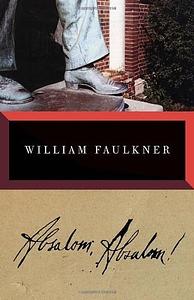Take a photo of a barcode or cover
challenging
dark
mysterious
4-5/5
I feel SO conflicted about this book.
On the one hand there's a level of complexity and obscurity that is incredibly satisfying to push through and uncover its secrets. The revelation in the seventh chapter all the way to the end was one of the most exhilarating left hooks l've ever received from a book.
Seriously incredible stuff.
On the other hand the build up to those payoffs wasn't as engaging to me as the build up of some of his other books, namely The Sound and the Fury, which achieves a similar level of AHA recognition and payoff. I think this is because the bulk of the novel is spent in the past and lacks the immediacy of As I Lay Dying and The Sound and the Fury.
HOWEVER, while I initially found this to be my experience, the book ends up becoming ABOUT history and the stories we tell and how history is a subjective telling, and so it really could not have been written any other way. Hence the book as a whole being a 5 star, but my experience reading it being more in the 4-5 star range.
I'll be mulling this over for a long time, which is a sign of a great novel in my opinion.
Absalom, Absalom is the story of the rise, decline and fall of a white family in Mississippi in the 19th century, by which Faulker also holds a mirror up to the society of the American South in general. Its plot is fairly simple: a mysterious man names Thomas Sutpen arrives in what is still frontier territory though with an economy already based on plantation slavery. He strikes a claim to one hundred square miles of land, marries a local woman, and has a son and daughter. Things seem idyllic, but then the Civil War interrupts, Sutpen’s son slays the suitor of Sutpen’s daughter for unclear reasons and flees, and ultimately Sutpen, his wife, and their daughter are dead and the vast estate is reduced to nothing.
Notice how I placed no spoiler warning there. Other authors might have gradually told this story over the whole book, but in Absalom, Absalom it is all laid out in the first pages. Rather, Faulker chooses a technique by which several characters retell these circumstances, and each time more and more detail is filled in. But by the end, Faulkner is also suggesting that this story gets warped in the telling, with people who never even knew the Sutpens adding their own guesswork to it.
The narration consists of the stream of consciousness technique, which gives the novel its deserved reputation as a work of high modernism. But there is a distinct approach to stream of consciousness: the tale of the Sutpen family is told by characters who are fairly simple, ordinary people (and in one case without much schooling at all), but the torrent of words that is their stream of consciousness makes use of lofty vocabulary and elaborate metaphors that are not realistic at all. The result is a novel of layers: the facts as they supposedly happened, the narrating characters’ particular attitude with regard to these facts, and over it all Faulkner’s literary flourish.
The plot itself is a fresh and original one, the Sutpen family’s drama is believable and gripping. I also enjoyed Faulkner’s social criticism, which suggests that the South was rotting with racism, and the loss in the Civil War was inevitable both in terms of its fatal decline and in terms of justice finally being done. It strikes us today as absurd that a person who was of 1/16 black ancestry could have been consigned for all his life to the lowest social position, but for the wealthy white families of the American South one’s bloodline was of the greatest importance. Faulkner also notes (a historical phenomenon that is rarely referred to today) how the Confederacy divided opinions even among Southern whites, and there were some who sided with the Union and faced retribution from their fellow citizens for it.
But ultimately I was left with mixed feelings about this book. To my mind, the novel could have naturally ended a whole chapter early, but Faulkner keeps going with a new narrative voice even though the dramatic arc of the book is arguably spent. And even though stream of consciousness is meant to feel raw and visceral, there is still a need for an author to subject his work to some editing to trim the most egregious instances of rambling, but I don’t feel this was done here. (I have similar feelings about Faulkner’s As I Lay Dying, incidentally a much more accessible introduction to the author than this.)
Notice how I placed no spoiler warning there. Other authors might have gradually told this story over the whole book, but in Absalom, Absalom it is all laid out in the first pages. Rather, Faulker chooses a technique by which several characters retell these circumstances, and each time more and more detail is filled in. But by the end, Faulkner is also suggesting that this story gets warped in the telling, with people who never even knew the Sutpens adding their own guesswork to it.
The narration consists of the stream of consciousness technique, which gives the novel its deserved reputation as a work of high modernism. But there is a distinct approach to stream of consciousness: the tale of the Sutpen family is told by characters who are fairly simple, ordinary people (and in one case without much schooling at all), but the torrent of words that is their stream of consciousness makes use of lofty vocabulary and elaborate metaphors that are not realistic at all. The result is a novel of layers: the facts as they supposedly happened, the narrating characters’ particular attitude with regard to these facts, and over it all Faulkner’s literary flourish.
The plot itself is a fresh and original one, the Sutpen family’s drama is believable and gripping. I also enjoyed Faulkner’s social criticism, which suggests that the South was rotting with racism, and the loss in the Civil War was inevitable both in terms of its fatal decline and in terms of justice finally being done. It strikes us today as absurd that a person who was of 1/16 black ancestry could have been consigned for all his life to the lowest social position, but for the wealthy white families of the American South one’s bloodline was of the greatest importance. Faulkner also notes (a historical phenomenon that is rarely referred to today) how the Confederacy divided opinions even among Southern whites, and there were some who sided with the Union and faced retribution from their fellow citizens for it.
But ultimately I was left with mixed feelings about this book. To my mind, the novel could have naturally ended a whole chapter early, but Faulkner keeps going with a new narrative voice even though the dramatic arc of the book is arguably spent. And even though stream of consciousness is meant to feel raw and visceral, there is still a need for an author to subject his work to some editing to trim the most egregious instances of rambling, but I don’t feel this was done here. (I have similar feelings about Faulkner’s As I Lay Dying, incidentally a much more accessible introduction to the author than this.)
challenging
dark
mysterious
reflective
tense
slow-paced
Plot or Character Driven:
A mix
Strong character development:
No
Loveable characters:
Complicated
Diverse cast of characters:
Yes
Flaws of characters a main focus:
Yes
This is a hard, hard read. It's only about 300 pages, but it's so dense (which I've come to expect from Faulkner). The narrative structure is very interesting and I like that there is a lot of ambiguity about what really happened to these people who are mostly all dead during or by the end of the story. It also gives a very complicated view of the south during the just pre to post-civil war. Most of the characters aren't good people, some of them are very bad people, but they all seem to be people. Honestly, the last paragraph of the novel bumped up the rating by 1/4 point because it really drove home the point of the novel in a way I didn't really see upon the first read until that point.
Graphic: Death, Incest, Racial slurs, Racism, Slavery, Classism
Moderate: Pedophilia, Fire/Fire injury
adventurous
challenging
dark
emotional
mysterious
sad
tense
slow-paced
Plot or Character Driven:
Character
Strong character development:
Complicated
challenging
mysterious
slow-paced
Plot or Character Driven:
A mix
Strong character development:
No
Loveable characters:
No
Diverse cast of characters:
No
Flaws of characters a main focus:
Yes
challenging
dark
emotional
reflective
sad
medium-paced
challenging
dark
emotional
sad
tense
slow-paced
Plot or Character Driven:
Character
Strong character development:
Yes
Loveable characters:
No
Diverse cast of characters:
Complicated
Flaws of characters a main focus:
Yes
challenging
reflective
slow-paced
Plot or Character Driven:
A mix
Strong character development:
Yes
Loveable characters:
Complicated
Diverse cast of characters:
Yes
Flaws of characters a main focus:
Complicated




